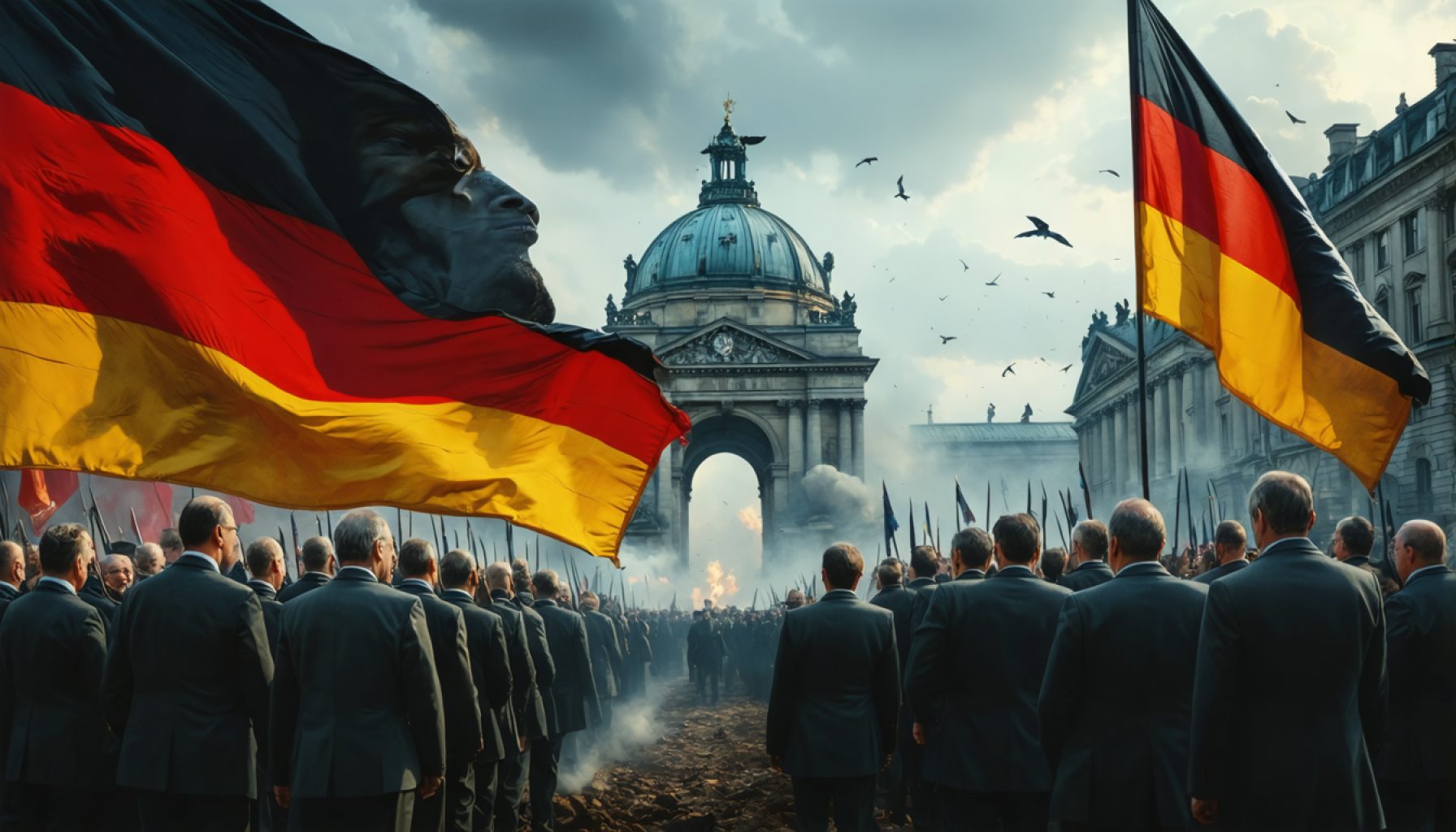- Germany’s political landscape is marked by a fierce contest between Friedrich Merz and Olaf Scholz for the chancellery.
- Merz, seeking redemption, aims to shape his image as a distinguished statesman despite past challenges.
- Scholz, known for his reserved nature, adopts a bold, rhetorically charged approach as the election approaches.
- Filmmakers Mathis Feldhoff and Andreas Huppert document this dramatic battle in their film, “Kanzler und Herausforderer – Scholz und Merz im Wahlkampf.”
- Scholz balances his extensive ministerial experience with a newfound audacity, while facing perceptions of being less favored.
- The election is marked by themes of legacy and tenacity, with the outcome set to resonate nationwide.
- Germany eagerly awaits the resolution of this gripping political saga, questioning if Merz can maintain his momentum against Scholz’s vigor.
Tucked beneath Germany’s political landscape, a dramatic clash unfolds as two titans vie for the chancellery. Friedrich Merz, a man often shadowed by impatience, grapples to mold himself into a vision of statesmanship. Meanwhile, Olaf Scholz, typically reserved, unveils a newly minted daring demeanor laden with pointed rhetoric. As Germany gears up for a fiercely contested election, the corridors of power echo with ambition and transformation.
Embarking on this gripping saga, filmmakers Mathis Feldhoff and Andreas Huppert meticulously chart the evolving narratives of these political adversaries. Under the lens of “Kanzler und Herausforderer – Scholz und Merz im Wahlkampf,” their cameras capture the tension of political trials and the spectacle of nationwide campaigns.
In Scholz, who dons the weight of past ministerial roles and a tenure as the beleaguered Bundeskanzler, there lies a paradox of experience and fresh audacity. Despite being cast as the least loved chancellor, his ardor betrays a buoyant self-belief, poised to change tides by election day.
Conversely, Merz’s journey wades through turbulent waters; pried from leadership by Merkel, he seizes the reins of opportunity, emerging as a consequential player. His odyssey promises a tale of redemption and resurgence — a testament to his calculated courage.
As the day of decision looms, this duel of legacy and tenacity captures a nation’s imagination, pondering who shall seize the political helm. The heartbeat of Germany resonates amid unanswered questions: will Merz sustain his lead, or will Scholz’s newfound vigor turn the tides? As their odyssey unfolds, Germany watches with bated breath.
The Political Showdown: Merz vs. Scholz – Who Will Lead Germany?
Overview: The Merz-Scholz Showdown
The German political landscape is poised for a significant transformation as Friedrich Merz and Olaf Scholz vie for the position of Chancellor. While the source article paints a vivid picture of their campaign journeys, it leaves several critical aspects unexplored. This article delves into those areas, providing readers with a broader understanding of the current political arena in Germany.
Real-World Use Cases: Leadership Styles and Impact
Friedrich Merz:
– Leadership Approach: Known for his pragmatic and business-friendly approach, Merz is expected to focus on economic reforms, tax cuts, and reducing bureaucracy.
– Social Issues: He faces criticism over his past conservative stances on social issues, which could shape voter perception.
Olaf Scholz:
– Policy Focus: Scholz, with his experience as Finance Minister, emphasizes social equality, climate policy, and European integration.
– Leadership Style: His reserved and calm demeanor contrasts with his recent bold rhetoric, suggesting a strategic shift to appeal to a broader electorate.
Market Forecasts & Industry Trends
– Energy Transition: Both candidates are expected to focus heavily on Germany’s energy transition, but Scholz might prioritize aggressive climate change policies.
– Economy: Merz is likely to advocate for policies that strengthen Germany’s industrial base, whereas Scholz’s approach may include increased public investment and social welfare programs.
Reviews & Comparisons
– Public Perception: Scholz enjoys a reputation for competence due to his financial expertise during crises, while Merz is seen as a fresh yet polarizing figure due to his conservative views.
– Debate Performance: Scholz’s newfound assertiveness could play well in debates, potentially swaying undecided voters.
Controversies & Limitations
– Merz: His close ties to business and past remarks on social issues could alienate younger and progressive voters.
– Scholz: The “Cum-Ex” tax scandal that occurred during Scholz’s tenure as Finance Minister remains a contentious issue that rivals might exploit.
Features, Specs & Pricing: Political Campaigns
– Campaign Funding: Merz reportedly enjoys solid funding from business sectors, whereas Scholz’s campaign has robust support from the SPD’s grassroots network.
– Advertising and Messaging: Scholz’s campaign focuses on inclusivity and stability, while Merz appeals to economic vigor and renewal.
Security & Sustainability
– Cybersecurity: Both candidates prioritize cybersecurity, aware of foreign meddling threats.
– Sustainability Policies: Scholz proposes green investments to consolidate Germany’s position as a leader in renewable technology, whereas Merz promises pragmatic solutions transitioning away from fossil fuels.
Insights & Predictions
– Electoral Prognosis: Scholz’s SPD could gain traction among working-class voters concerned with social welfare, while Merz aims to swing centrist and business-oriented voters.
– Post-Election Scenarios: Coalition talks are inevitable. The Greens or FDP might play kingmaker roles depending on election outcomes.
Pros & Cons Overview
Olaf Scholz:
– Pros: Competence in financial matters, pro-environment stance, experienced in governance.
– Cons: Past scandals, potentially limited appeal to conservative voters.
Friedrich Merz:
– Pros: Business acumen, promises of economic vitality, fresh leadership.
– Cons: Controversial views, relatively inexperienced in top government roles.
Actionable Recommendations
1. Engage with Local Debates: Attend or watch debates to better understand candidates’ positions.
2. Research Policies: Compare policy stances on key issues like climate change and economic recovery.
3. Join Political Discussions: Join community forums and discussions to exchange views and gain insights from peers.
For those looking to stay updated on German politics, reliable news outlets such as DW and Bundesregierung offer comprehensive coverage and expert analyses.
In conclusion, this political duel between Scholz and Merz is not only about leadership styles but also about the direction Germany will take on pivotal issues like economic recovery, social policy, and environmental sustainability. The outcome could redefine Germany’s role in Europe and beyond.
